Blog:
Local TV News: More potential than present value

Despite the proliferation of online sources, most Americans still rely on local TV to find out what’s happening in their communities, particularly during big, breaking news. But TV news is changing. Newsrooms are consolidating and stations downsizing. Some share or outsource reporting.
We at the JA wondered how local TV has changed to inform and interact with local communities. How might people maximize what they get from this powerful medium with its known brands? What is, we wondered, the value of local TV news? As background for our forum digging into this question, we interviewed a couple of folks who come at this from different perspectives. We sought to better understand their passions and values – what gets them to the beliefs they hold about the value of local TV news?
Below, meet Josh Stearns and Libby Reinish with Free Press, an organization currently campaigning against joint station ownership and joint news production. Here, read an interview with Mark Platte, a news director running one newsroom that feeds three stations. To jump into the JA forum on the potential value of local TV news, click here.
About Josh and Libby
 Josh Stearns is Associate Director for Free Press, an organization started in 2002 by media scholar Robert W. McChesney and Josh Silver, the current CEO of Democracy Fund. Stearns oversees Free Press campaigns around journalism and media consolidation and writes extensively.
Josh Stearns is Associate Director for Free Press, an organization started in 2002 by media scholar Robert W. McChesney and Josh Silver, the current CEO of Democracy Fund. Stearns oversees Free Press campaigns around journalism and media consolidation and writes extensively.  Libby Reinish is Free Press’s Program Coordinator, working to build on-the-ground support for the Free Press Change the Channels campaign. She was a co-founder of Valley Free Radio, a low power station in Northampton, Mass.
Libby Reinish is Free Press’s Program Coordinator, working to build on-the-ground support for the Free Press Change the Channels campaign. She was a co-founder of Valley Free Radio, a low power station in Northampton, Mass.
JA: What do you see as the value right now of local TV news to the communities it serves?
LR: What I see is a medium that has a lot more potential than maybe present value. We have these public airwaves used by commercial broadcasters in exchange for serving the public interest in certain ways. It’s a service that an overwhelming majority of Americans use as primary source of local news. But no one would stand up and say this is great, I love watching extensive reporting on weather, sports, if it bleeds, it leads. But I think it’s too quick to call it a lost cause. I think it’s really important to keep in mind that broadcasters have made a bargain with public – and it’s really important to envision what [that] could look like, and what value it could provide to community.
JS: I think you’d get broad agreement that video is one of most powerful mediums of the modern age. Radio, newspaper, everyone has video now. Ethan Zuckerman recently said video is becoming the universal human language. Videos move people to action in a way that maybe no other media can. I think that power is what the potential of local news could be. Why aren’t local news stations using the power of video to address the central issues of our time?
You say “nobody would stand up and defend it.” Why do you think people still watch it?
LR: For one thing, it’s free, over-the-air broadcasting.
JS: If you look at where local news is produced and who has access to it, there’s not that many choices. So when it comes to finding out who won the election, what the big debates are at city council, you just don’t have that many choices. Maybe you have a local paper, if still covers city council. But when people want to find out what happening in their local community they turn to local stations. The brands have been around, and relied on. But they’re not providing the civic purpose.
What would your dream version of local TV news look like?
LR: I don’t think there’s a prescription. My dream would reflect what’s actually going on in the local community. It would serve as a watchdog, hold government and companies accountable, it would have a finger on pulse of what’s really going on. And it would represent all diverse voices and communities that make up the broadcast area.
JS: This is an interesting thought experiment. The first problem is that out of a 30 minute newscast, eight minutes are commercials. So let’s say you have 20 minutes. Let’s allow for a minute of weather. Maybe 2-3 minutes of high school or local sports, because people do care about these things. And that’s important. Now we’re talking 15 minutes. What if we had something even really formulaic – let’s say three 5 minute blocks. What if one was on local government, one on social issues – health, education, poverty, environment – and then you’re left with five more minutes, and I’d love to see something around economics – that could be holding corporate leaders accountable, or the state of job growth. . .it could be any number of things.
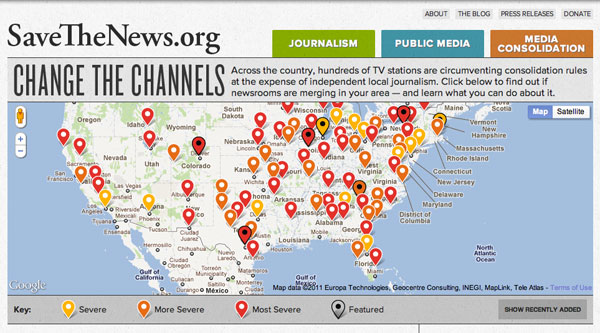
Media Consolidation Map from Free Press's Change the Channels
What makes you believe that’s what people want?
JS: Let’s start out by admitting that sensationalism sells. It’s just that people want other things too. It’s not a free market when the answer to “You don’t like what we do?” is “Go to our competition. Oh, we do the program for the competition too.” Studies have shown that people are consuming more news than ever before. J-Lab did a study in Philadelphia on what people want from local news. Again and again, people were asking for more accountability, more of a watchdog function. When we go into communities, people can articulate well what they want, but there is no way for them to make themselves heard to a body that could make that change.
LR: These days people want to know where their food comes from, who owns their local businesses. I think we need to apply a similar concept to local news.

Libby Reinish (left) and volunteer Kara Elder dressed as TVs at the Bioneers conference in San Francisco, October 2011. Photo by Elizabeth Dubuque.
What would it take to get there?
LR: I think there are a number of things that stand in the way. One is that broadcasters really have gotten very creative to find ways to avoid meeting public interest obligations. We
need the FCC to enforce the bargain. The common argument for broadcasters is times are tough, and there’s not enough money to produce expensive local news. So it’s OK to produce less or outsource to a former competitor. But it’s not true. They’re padding the bottom line. We need to overcome that poverty myth.
JS: Let’s not look at a new business model, but look at the expectations. If the current model is based on having as the #1 goal to put money in shareholders in pocket – then you’re going to try to maximize the amount that’s going back to pockets. To do that, cutting jobs makes sense. We want [a] system where the company is encouraged to invest back in to journalism. Maybe making 4%. Maybe 10. I’d love to be making 10% on any of my investments right now.
LR: There is going to be a huge increase in political campaign money in this and all future election cycles – a lot of money will be funneled into media companies in the form of ads. It will be a big increase in revenue. I’m very curious to see what could be done with some of that revenue, instead of applying it straight to the bottom line.
Why do you do this work?
LR: To me, it really is about the ability for people to participate in our democracy and get access to news and information that they need to make informed decisions. I know it’s a talking point for us, but it really is true for me. I don’t believe our democracy can function without an informed citizenry.
JS: For me it gets down to the question of who has ability to tell their story and look at their media to see stories that reflect their own passions and concerns. I come out of doing conservation and youth development. A lot of young people I worked with looked at the media and didn’t see anything that reflected their perspectives. So I began looking at the gatekeeper role the mainstream media played.


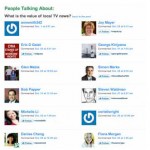
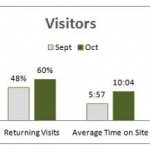
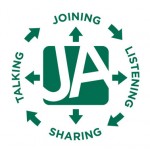
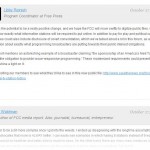








Weigh In: Remember to refresh often to see latest comments!
0 comments so far.